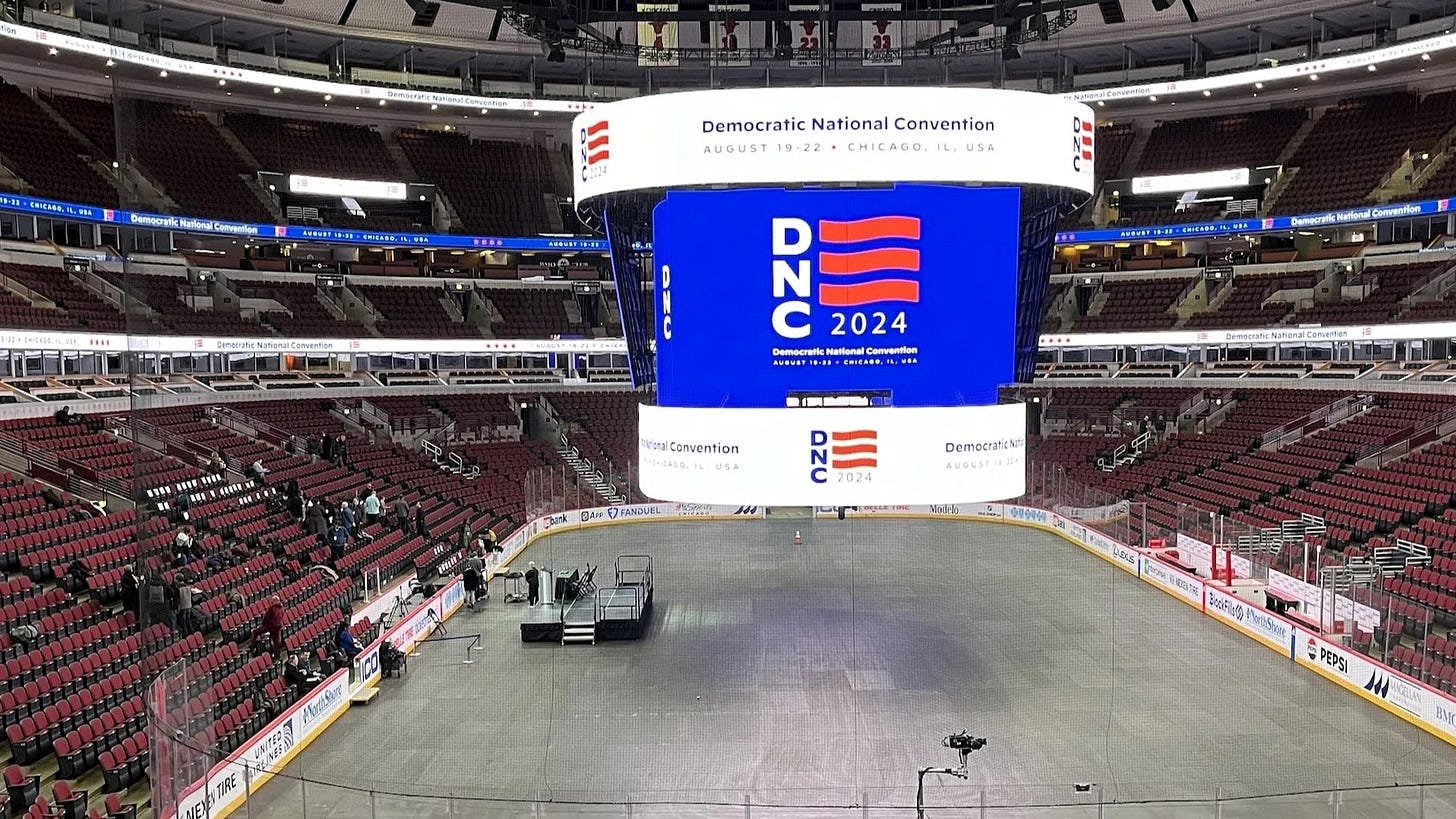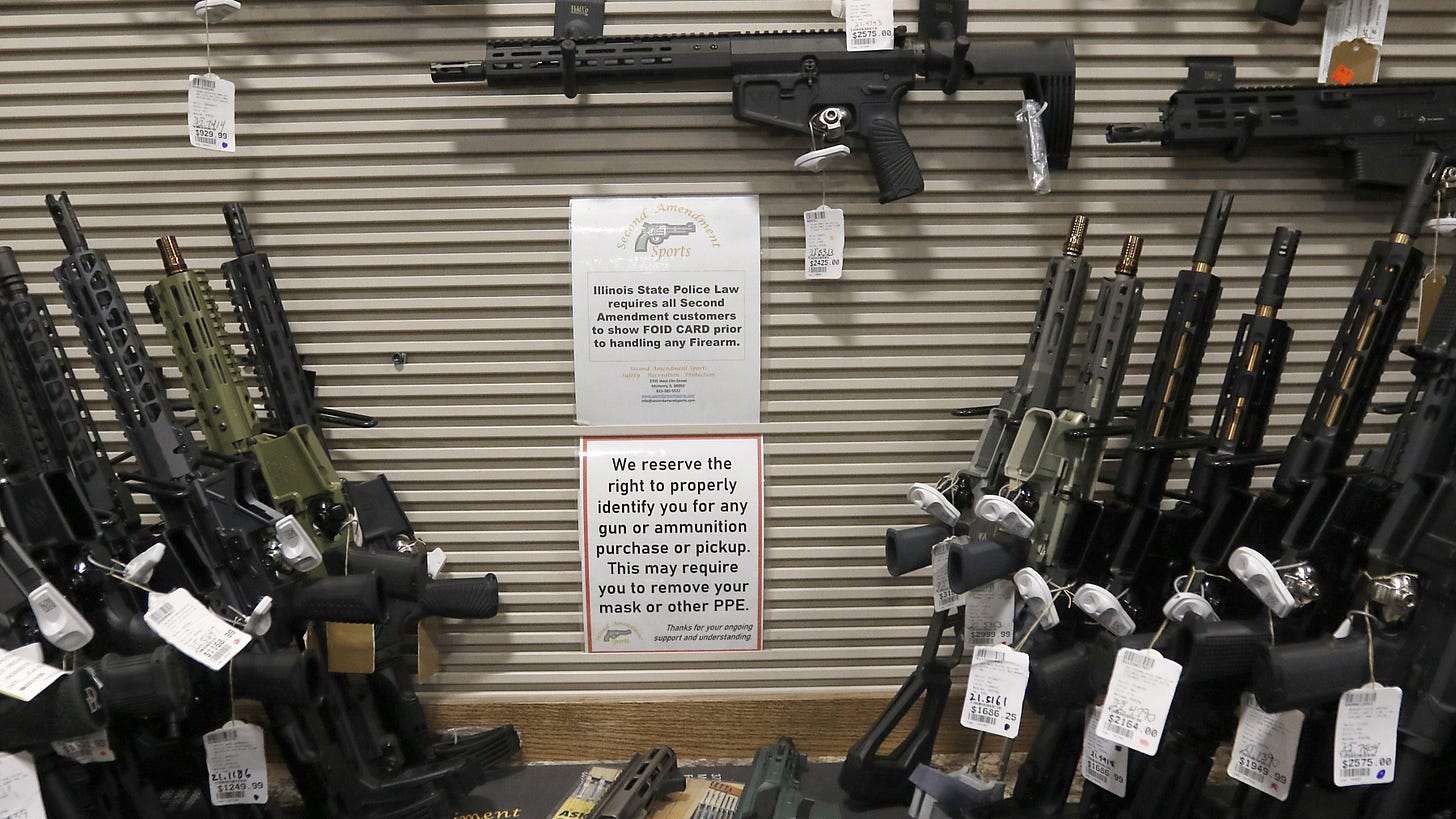THE ILLINOIZE: Monday Free for All...One week from the DNC...Gun sales increase...Should the government prop up a grocery store?
August 12, 2024
Good morning, Illinois.
Happy Monday. It’s one week from the Democratic National Convention in Chicago and we have Governor’s Day and Republican Day at the Illinois State Fair this week.
The politics for the fall have begun (as if they every really stopped.)
We’ll be doing a lot more on legislative races that nobody else really seems to be covering in the next few weeks. Join us now as a paid subscriber to help us traverse the state and get on the ground for big legislative races.
There’s nothing on Governor Pritzker’s public schedule today.
Let’s get to it.
YOUR MONDAY FREE FOR ALL
(note: we’re not responsible for paywalls and restrictions from other news outlets, because good journalism isn’t free)
With Democratic National Convention imminent, groups exchange barbs over planned pro-Palestinian protests (Chicago Tribune)
Less than two weeks before protesters are expected to march on the Democratic National Convention, pro-Israel advocates gathered in Chicago to warn that demonstrations could lead to violence and “anti-American” acts, an allegation one pro-Palestinian group characterized as baseless fearmongering as the event approaches.
The Israel-Hamas war triggered by the Oct. 7 terror attack has led to tens of thousands of deaths and widespread destruction and starvation in Gaza, accusations of detainee abuse and ongoing fears of a wider war in the Middle East. Protesters around the country have heavily criticized the Biden administration’s response to the conflict and Democratic politicians’ support of Israel, including during a wave of unrest at college campuses across the country.
Protests have persisted nationally and here in Chicago, said David Goldenberg of the Anti-Defamation League, citing demonstrations in Washington, D.C., at which flags were burned and landmarks defaced. Their fear, speakers said at a Thursday news conference at the Jewish United Fund, is that outside protesters would escalate an already tense convention environment and encourage violence against Jewish people.
“The same network of groups who organized, promoted and celebrated many of those dangerous protests are coming here to the DNC,” Goldenberg said.
Among the groups Goldenberg accused of overheated rhetoric was the U.S. Palestinian Community Network, which has been instrumental in organizing what is expected to be the most prominent protest march on the DNC.
In response, a USPCN representative called that “slander and fearmongering.”
“We’ve never called for violence, actually, against anyone,” Muhammad Sankari told the Tribune. “Yes, we have organized dozens of protests in Chicago … we’ve mobilized hundreds of thousands of people into the streets without incident. And so that, I think, speaks for itself.”
The phrase “anti-American” is just an “easy buzzword,” Sankari said.
Related: Pritzker serves up a cold one, debuts JBeer — two new Chicago craft beers for Democratic convention events (Chicago Sun-Times)
DNC cleanup aims to improve Chicago beyond the convention, but also echo 1996 efforts (Chicago Tribune)
Pritzkers throwing big Salt Shed party with John Legend on second day of Dem convention (Chicago Sun-Times)
What to eat, see and do while attending the 2024 Democratic National Convention in Chicago (WBEZ)
Views from the front lines of Chicago's 1968 DNC protests; Grant Park 'free-for-all' (Chicago Sun-Times)
Barack Slept Here (Chicago Magazine)
Despite new assault weapons ban, gun sales increased last year in Illinois (Peoria Journal-Star)
Gun sales in Illinois went up 5% in the past year despite a recently enacted ban on assault weapons, according to data compiled by a national home safety and security news site.
SafeHome, which deems itself as a "trusted authority on home and personal security," said that 504,452 firearms had been sold statewide in 2023, up 5% from similar numbers in 2022. SafeHome used data from the Federal Bureau of Investigation's NICS system, which tracks the number of background checks provided in each state across the country.
The data is then included in a formula that counts each check for handguns and long firearms as worth 1.1 purchases and each multiple-gun verification as worth two purchases. According to SafeHome, they looked to examine the impact of gun sales on American society as a whole.
"By analyzing this data, we aim to provide a clearer picture of gun sales trends and their broader implications for American society," the article said. "We hope that a deeper evaluation of this information can help policymakers and the public better understand this complex issue."
Illinois' 5% increase in projected gun sales was the second most in the United States in 2023, behind North Carolina, which saw a whopping 110% increase in sales.
SafeHome noted that the increase in gun purchases came despite the passage of the Protect Illinois Communities Act, which banned assault weapons from being sold and possessed across the state.
The government spends millions to open grocery stores in food deserts. The real test is their survival. (Capitol News Illinois)
More than 100 people congregated in the parking lot of Rise Community Market on its opening day a little over a year ago. As they listened to celebratory speeches, the audience erupted into joyful exclamations: “Mercy!” “Wonderful!” “Wow!” “All right!” Colorful homemade signs raised by local leaders beckoned the crowd to join in: “We!” “Are!” “No!” “Longer!” “A!” “Food!” “Desert!”
For most American cities, the opening of a new grocery store barely warrants a mention. But in Cairo, the government seat of Illinois’ poorest county and the fastest-shrinking one in America, business openings are rare. And for residents who for years had to travel long distances to buy food, it was a magical moment.
“Access to healthy foods and fresh produce is not just about groceries. It’s about justice,” declared Juliana Stratton, Illinois’ lieutenant governor, to the cheering crowd that gathered in Illinois’ southernmost city.
Cairo, she said, had set the stage for what was to come as Illinois embarked on its new grocery store initiative — a $30 million endeavor to build and sustain new food businesses in distressed small towns and urban neighborhoods. Stratton had assisted Cairo leaders in securing state funds from another source because Rise came before the launch of the grocery program, and she told the crowd it would serve as a beacon: “I want you to know, Cairo, Illinois, this is only the beginning, and you are leading the way.”
Within months, however, the store fell on hard times. Rise struggled to compete with national chains on pricing and then faced additional challenges when a walk-in cooler broke a few months later, making it impossible to keep perishables on the shelves between orders. Although sales were initially strong, they slumped as residents fell back into old shopping patterns, patronizing the two nearby Dollar General stores or traveling to Walmart and other supermarkets at least 30 miles outside of town. As fewer customers came in, the store had less money to restock its most popular items. Shelves grew emptier.
Clarissa Dossie, a cashier at Rise since its opening, said that during the worst months, people would come in, look around and say, “Dang, where the groceries at?”
By December, six months after it opened, Rise was in peril.
The concept appears straightforward: Use government funds to help build stores, shorten the trek for fresh food, and in the process, make people healthier and bolster the local economy. In distressed communities, grocery stores have been shown to anchor business development, help grow the tax base and even boost home values, according to one study of Pennsylvania’s program. The converse is also true: “Without the grocery store, communities just have a really hard time succeeding economically,” said Christopher Jones, a senior vice president with the National Grocers Association.
But the way Rise Community Market has struggled in Cairo illustrates how these programs fall short. Because what happens after a store opens is just as important — and despite the up-front financial investments, that hasn’t been solved at all.
Places like Cairo, population 1,600, have paid the price: Its residents have spent more money on gas and rides, or settled for less nutritious options at dollar stores. About 17% of Cairo families don’t have a car, according to USDA’s food atlas. The town saw little economic benefit from the estimated $6.4 million annually Cairo spent in recent years on groceries, most purchased out of state. (Cairo is a short drive from both Missouri and Kentucky.)
TOP STORIES LAST WEEK ON THEILLINOIZE.COM
POLITICAL POTPOURRI
State sued by conservative think tank over new pro-union law (Crain’s Chicago Business)
Ex-deputy who killed Sonya Massey had history of complaints involving women (State Journal-Register)
‘A movement, not just a moment’: Inside Illinois’ reparations efforts (Chicago Tribune)
Bears to host stadium focus groups in Schaumburg and downtown Chicago this week (Daily Herald)
State now has blueprint for K-12 schools to teach dangers of overdose (Capitol News Illinois)
What you should eat at the 2024 Illinois State Fair (Bloomington Pantagraph)
Editorial: What's next for Ford's Torrence Avenue plant in the EV age? (Crain’s Chicago Business)
Opinion: Why would Illinois Democrats knock on doors in Wisconsin? ‘The election is likely to be decided there.’ (Chicago Sun-Times)
Opinion: A closer look at Illinois' track record on racial equity (Crain’s Chicago Business)
Opinion: Collaboration key to moving the needle on conservation (Shaw Media)
JOIN US












